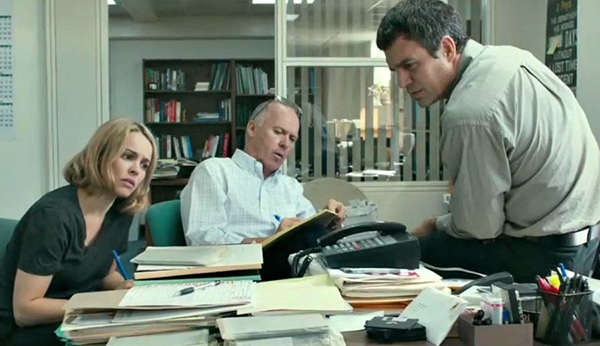Poppin’ Molly – What Spotlight and Room get right in their depictions of sexual assault victims
|
It’s no secret that the Oscars kind of fucked up this year. Between the predominantly white nominees and the shocking lack of Sicario from most major categories, it would seem that the members of the Academy forgot to go to the movies this year. But – despite my fondness for a good bitch session – I’m not here to rant about how wrong they got it. (Shocking, I know!)
Despite all the scandals and snubs, the Academy actually did manage to get something right. There were two movies this year that portrayed the stories of victims of sexual assault in a nuanced, respectful manner – Room and Spotlight. And the Academy, despite turning a blind eye to much of the other brilliant work produced this past year, recognized them for the beautiful works that they are. And with all the talk of representation, and what that means, I thought it was important to acknowledge these two films. Because, while they may not mean much to you, they mean quite a bit to me.
I am a victim of sexual assault – both as a child and an adult. I have been extremely lucky to find an excellent therapist who specializes in trauma and have found a sense of peace and resolution through the years of work with her. I’ve had major support from my family and friends and their love has made the most difficult times more bearable. But what I don’t have is the ability to change the past. No matter how much work I do – the meditation, the journaling, the Eye Movement Desensitization Reprocessing (EMDR) – it will not change the fact that I was sexually assaulted at multiple points in my life.
No matter how much better I get, I don’t have the ability to turn off these events just because I want them to go away. I can’t turn them on in order to make myself more sympathetic or tragic. I can’t overcome Post-Traumatic Stress Disorder (PTSD) in order to transform myself into a strong, powerful woman. And I can’t trigger myself in a perfectly delicate manner to fashion myself into a desirable damsel in distress. Trauma doesn’t work like that. It doesn’t show up when it’s convenient and it doesn’t go away when you want to move on.
Hollywood doesn’t exactly get that.
No, Hollywood seems stuck in the notion that sexual assault is bad and hasn’t really evolved past that. It’s not exactly difficult to see it depicted in film and television. But depicted in a manner that doesn’t just exploit the act as a way to demonize a man or traumatize a beloved family member? Well, that’s a whole different story. You wanna take down a motorcycle gang? Don’t worry about your hundreds of guns, just gang rape their beloved matriarch! Wanna show the audience how terrible prison is? Throw in some rape! (Bonus points if you amp up the homophobia!) Wanna make us sympathize with a tormented male character? Zoom in on his distressed face as he witnesses a violent rape inside the castle.
And then it’s over. The gangs go to war, the prisoner feels the pain he deserves and we all learn a valuable lesson about how terrible it is to watch someone be raped – until next week when we inevitably have to learn it again on another channel. But it doesn’t exactly work that way. And while I will make room for artistic license, I’m pretty fucking sick of seeing sexual assaults portrayed as lessons that use the victims as props.
But Room and Spotlight are different. Both films highlight the stories of victims lives after their assaults and treat them as, well, people deserving of respect. The assaults are necessary to the plot of both films, as opposed to many of the graphic depictions of rape that are shoehorned into other plotlines for shock value. Both stories show the emotional consequences suffered by a victim of sexual assault, portraying them as neither impossibly strong or tragically suffering, but simply people who have undergone a traumatic experience.
I love all things pop culture (hi, I write for a pop culture website), but when it comes to this aspect of my life, it can be a real minefield. Sexual assault has become such an abused plot device that it can be hard to comfortably sit down and watch anything – hence my thrice-yearly viewing of Frasier. And heaven forbid you ask for a trigger warning for graphic depictions of rape! Then you’re just asking to be coddled! So, I very often get stuck in the odd position of wanting to see my story portrayed but, you know, not wanting to relive the graphic nature of my attacks in an overdone Hollywood studio film. This is how I find myself watching an inappropriate number of Lifetime Original Movies.
But then stories like Room and Spotlight come along. Stories where the victims are allowed to speak for themselves with dignity, flaws and their own personality quirks. I know movies aren’t everything, but as a victim myself, I can’t tell you how much it means to see my experiences represented in such an honest, respectful manner.
It may not change the fact that, once again, #OscarsSoWhite, but any shift towards recognizing films with more nuanced representation is a step in the right direction.
Molly Regan is an improviser and writer in Baltimore. She likes chicken pot pie, Adam Scott’s butt and riot grrl.
Related Posts:


